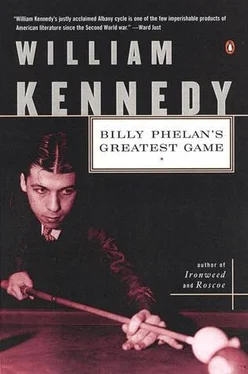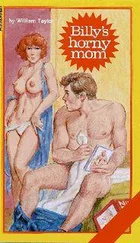He watched Betty Rubin, who was beginning to look good.
Billy hated the sons of bitches who closed the town to him, including Red Tom, you prick. Why don’t you yell at them that it ain’t right to do such a thing?
He would not test out any more places. He would do something else.
Tough as Clancy’s nuts.
And to think, Billy, that you were afraid they’d mark you lousy if you finked.
“Oh yeah, I forgot,” Moonlight Brady said. “I saw your father’s name in the paper. That vote business. Funny as a ham sandwich on raisin bread.”
“That’s in the paper, too?”
“Same paper. They mentioned how he played ball so I knew it was him.”
“Where’s your father now, Moonlight?”
“He died ten years ago. Left me a quarter of a million he made on the stock market, every nickel he had, and I went through it in eighteen months. But it was a hell of an eighteen months. What a guy he was.”
Billy laughed at that. It was one of Moonlight’s wilder, more unbelievable lies, but it had what it takes, and Billy’s laughter grew and grew. It took on storm proportions. He coughed and tears came to his eyes. He hit the bar with his hand to emphasize the power of the mirth that was on him, and he took out his handkerchief to wipe his eyes.
“What got him?” the barman asked.
“I did,” Moonlight said, “but I don’t know how.” Moonlight was doing his best to keep smiling. “If the line is that funny, I oughta use it in the act,” he said to Billy.
“Oh absolutely, Moonlight, absolutely,” Billy said. “Use that one in the act. You gotta use that one in the act.”
Billy walked down Green Street and looked at the whorehouses with their awnings, the sign. They were houses that used to be homes for Irish families like his own. Chinks on the street now, and second-hand clothing stores and the grocery where George used to write numbers upstairs. Bucket-of-blood joints and guinea pool rooms where the garlic smell makes you miscue. Bill Shea lives on Green Street, the son of a bitch. Billy brought him home one night in a cab, sick drunk from Becker’s, and he forgets that and says my twenty is dead.
Billy walked into a telephone pole.
Really in the guinea section now. Billy went with a guinea for two years. Teresa. Terrific Teresa. A torch singer. “Along Came Bill,” she’d sing when he showed up. She wanted to get married, too.
Angie, you bitch, where are you when I need you?
Would Billy marry Angie? “Frivolous Sal.” Peculiar gal.
Angie got Billy thinking about marriage, all right, and now he thinks of Peg and George and the house they’ve got, and Danny. They can’t fence you out of your own house. They can’t fence you away from your kid.
His father fenced himself out of the house because he thought they were ready to fence him out.
Billy can hear a mandolin being played in a second-floor apartment and he can taste the dago red. He got drunk once on dago red with Red the Barber, dago red and mandolins, and he went out like a light and woke up the next day and lit a cigarette and was drunk all over again. So he don’t drink dago red no more.
After he crossed Madison Avenue, the bum traffic picked up. He turned on Bleecker Street toward Spanish George’s. It was moving toward eleven o’clock. Hello, Bill.
The stench of Spanish George’s hit Billy in the face when he walked through the door, the door’s glass panel covered with grating on both sides. A dozen bums and a woman were huddled around five round wooden tables, three of the bums asleep, or dead. The stench of their breath, their filth, their shitty drawers, the old puke on their coats and shirtfronts, rose up into Billy’s nose like sewer gas.
George was behind the bar in his sombrero, propped against the wall on the back legs of a wooden chair. Billy ordered a scotch, and George delivered it in a shot glass. Billy tossed it off and asked for another.
“You know anybody named Francis Phelan?” he asked George.
George eyed him and touched the handle of his six gun.
“You ain’t a copper. I know coppers. Who are you?”
“I’m a relative. The guy’s my father.”
“Whoosa guy you want?”
“Francis Phelan.”
“I don’t know nobody that name.”
Billy ordered another scotch and took it to the only empty table in the room. The floor beneath his feet had been chewed up long ago by old horses’ hooves and wagon wheels. It looked like the faces in the room, old men with splintered skin. The wagons of the old days had rolled over them, too, many times. Most of them seemed beyond middle age, though one with a trimmed mustache looked in his thirties. Yet he was a bum, no matter what he did to his mustache. His eyes were bummy and so were his clothes. He was at the table next to Billy and he stank of old sweat, like Billy’s locker at the K. of C. gym. Billy was in the Waldorf one night, and an old drunk was raving on about his life. Not a bum, just an old man on a drunk, and he looked clean. He got Billy’s eye and told him, Son, have B.O. and they’ll never forget you.
Unforgettable stench of right now. They oughta bottle the air in this joint and sell it for stink bombs.
The man with the mustache saw Billy looking at him.
“You fuck around with me,” the man said, “I’ll cut your head off.” The man could barely lift his glass. Billy laughed out loud and other men took notice of him. He could lick any four of them at once. But if they got him down, they’d all kick him to death. Billy saw that the men had no interest in him beyond the noise he made when he laughed.
The woman at the far table was drinking beer and sitting upright and seemed the soberest one in the room, soberer than Billy. Old bat. Fat gut and spindle legs, but her face wasn’t so bad. She wore a beret off to the left and smoked a cigarette and stared out the front window, which was also covered with grating. Bums like to put their hands through windows. And their heads.
The man next to the woman lay with his face on the table. He moved an arm, and Billy noticed the coat and remembered the twill. Billy went across the room and stood beside the woman and stared down at his father. The old man’s mouth was open and his lips were pushed to one side so that Billy could see part way into the black cavity that had once been the smile of smiles.
“I don’t want any,” the woman said.
“What?”
“Whatever it is you’re gonna ask.”
“Conalee Street.”
“I don’t want any.”
“Neither do I.”
“Go way and leave me alone. I don’t want any.”
“Is he all right?”
“Go way.”
“Is he all right? I asked a polite question.”
“He’s all right if he ain’t dead.”
Billy grabbed a handful of her blouse and coat just below the neck and lifted her halfway to her feet.
“Holy Mother of God, you’re as crazy as two bastards.”
“Is he hurt?”
“No, he’s passed out, and he’ll probably be out for hours.”
“How do you know that?”
“Because he drank whiskey. He had money and he drank whiskey till he fell over. He never drinks whiskey. Who the hell are you?”
“I’m a relative. Who are you?”
“I’m his wife.”
“His wife?”
“You got very good hearing.”
“His wife?”
“For nine years.”
Billy let go of her coat and slumped into an empty chair beside her.
When he told his mother he’d met him he made sure Peg was in the room. They sat in the breakfast nook, just the three of them, George still working. Billy was looking out at the dog in the back yard, and he told them all that had happened and how he wouldn’t come home. The response of the women bewildered Billy. His mother smiled and nodded her head. Peg’s mouth was tight, the way it gets when she fights. They listened to it all. He didn’t say anything about Gerald just then. Just the bail and the turkey and the money he had and the way he looked and the change Billy saw from the photograph. I’m goddamn glad you didn’t bring him home, Peg said. I don’t ever want to see him again. Let him stay where he is and rot for all of me. And Ma said, No, the poor man, the poor, poor man, what an awful life he’s had. Think of what a life he could’ve had here with us and how awful it must’ve been for him as a tramp. But neither of them said they were sorry he didn’t come home. They think of him like he was some bum down the block.
Читать дальше












